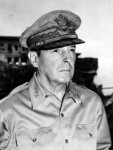 Douglas MacArthur (1880-1964) was a US Army general, famous for his roles as a battlefield commander during World War II and the Korean War. Born in Little Rock, Arkansas, MacArthur was the son of a decorated Civil War colonel and was raised on military bases. In his teens, he received a military education in Texas, then as a cadet at West Point. MacArthur was an infantry commander during World War I. He served with distinction, beginning the war as a captain and finishing it as a brigadier general. After World War I MacArthur served as superintendent of West Point then as field marshal of the fledging Philippines Army. He is perhaps best known for leading a stoic but unsuccessful defence of the Philippines against Japanese invasion in 1941-42, declaring on his retreat from the islands that “I shall return”. MacArthur was the supreme commander of the US war effort in the Pacific and later oversaw the Japanese surrender and the occupation of Japan.
Douglas MacArthur (1880-1964) was a US Army general, famous for his roles as a battlefield commander during World War II and the Korean War. Born in Little Rock, Arkansas, MacArthur was the son of a decorated Civil War colonel and was raised on military bases. In his teens, he received a military education in Texas, then as a cadet at West Point. MacArthur was an infantry commander during World War I. He served with distinction, beginning the war as a captain and finishing it as a brigadier general. After World War I MacArthur served as superintendent of West Point then as field marshal of the fledging Philippines Army. He is perhaps best known for leading a stoic but unsuccessful defence of the Philippines against Japanese invasion in 1941-42, declaring on his retreat from the islands that “I shall return”. MacArthur was the supreme commander of the US war effort in the Pacific and later oversaw the Japanese surrender and the occupation of Japan.
When South Korea was invaded by North Korea in 1950 MacArthur, by now aged 70, was appointed commander of the United Nations coalition forces. He oversaw the amphibious invasion at Inchon in September 1950 and the capture of Pyongyang the following month. MacArthur became enormously popular with the American public, however, he had a difficult working relationship with civilian leaders. President Harry Truman considered MacArthur a glory-seeking egomaniac, describing him at one point as “God’s right hand man”. While Truman was eager to avoid a full-scale war with communist China, MacArthur spoke openly of his wish for such a conflict – including, if necessary, the use of nuclear weapons. MacArthur made public comments on the war that were politically insensitive and extended beyond his authority as a military commander. In April 1951, it emerged that MacArthur had communicated with members of the US Congress and criticised Truman’s handling of the war effort. Truman responded by dismissing MacArthur and ordering his recall to the US. The sacking of MacArthur, who was still popular with the public, proved controversial for Truman and his administration. It contributed to Truman’s decision to retire from the presidency in 1952.
After his removal MacArthur went into immediate retirement, delivering a farewell address to Congress. He embarked on a speaking tour, where he continued to criticise Truman and his handling of the Korean War. MacArthur declared his willingness to accept the Republican nomination for the 1952 presidential election, however, he refused to campaign for it so was not seriously considered. MacArthur retired to New York City but continued to offer military advice to presidents Eisenhower, Kennedy and Johnson. MacArthur died in April 1964, aged 84, and was given a state funeral. Historians recall him as an outstanding general, chiefly for his strategic leadership during World War II, though his bullish relationship with civilian politicians proved problematic in the nuclear age.
Content on this page is © Alpha History 2018-23. This content may not be republished or distributed without permission. For more information please refer to our Terms of Use.
This page was written by Jennifer Llewellyn and Steve Thompson. To reference this page, use the following citation:
J. Llewellyn & S. Thompson, “Douglas MacArthur”, Alpha History, accessed [today’s date], https://alphahistory.com/coldwar/douglas-macarthur/.
